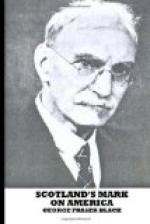industry of that state. Walter Callender, born
in Stirling in 1834, was founder of the firm of Callender,
McAuslan, and Troup, of Providence. E.J.
Lindsay, born in Dundee in 1838, was manufacturer
of agricultural implements in Wisconsin. Alexander
Cochrane, born at Barrhead in 1840, was a great chemical
manufacturer. Edwin Allen Cruikshank, born in
1843 of Scottish ancestry, was a real estate operator
and one of the founders of the Real Estate Exchange
in 1883. George Harrison Barbour, born in 1843
of Scottish parentage, was Vice-President and General
Manager of the Michigan Stove Company, the largest
establishment of the kind in the world. William
Marshall, born in Leith in 1848, was founder of the
Anglo-American Varnish Company (1890). Robert
Means Thompson, born in 1849 of Scottish ancestry,
was President of the Orford Copper Company, one of
the largest producers of nickel in the world.
William James Hogg (b. 1851), carpet manufacturer
in Worcester and Auburn, Massachusetts; and Francis
Thomas Fletcher Lovejoy, Secretary of the Carnegie
Steel Company were of Scottish descent. William
Howe McElwain (b. 1867), shoe manufacturer in New
England, is of Argyllshire descent; and the Armours
of Chicago, descended from James Armour, who came
from Ulster c. 1750, claim Scottish ancestry.
William Barbour (b. 1847), thread manufacturer, was
grandson of a Scot who moved from Paisley, Scotland,
to Lisburn, Ireland, in 1768, and in 1784 established
what is now the oldest linen thread manufacturing
establishment in the world. George A. Clark (1824-73),
born in Paisley, established the thread mills at Newark,
New Jersey, the business of which was carried on by
his brother William (b. 1841), who came to the United
States in 1860. The great Coates Thread Mills
at Pawtucket, Rhode Island, are a branch of the firm
of J. and J. Coates of Paisley. Hugh Chalmers
(b. 1873), President of the Chalmers Motor Company,
of Detroit, is descended from Thomas Chalmers who came
from Scotland early in the nineteenth century.
Ramsey Crooks (1786-1859), fur trader, born in Greenock,
Scotland; came to America and settled in Wisconsin.
In 1809, he entered the service of John Jacob Astor
and made, with Donald Mackenzie and Robert Stuart,
the memorable 3,500-mile trip to Astoria, on the Pacific
Ocean. In 1834, he settled in New York and engaged
successfully in business. During his residence
at Mackinac Island, Mich., and on his adventurous trips
he was a great friend and confidant of the Indians.
Black Hawk said he was “The best paleface friend
the red men ever had.” Mention may also
here be made of the Anchor line of Steamships founded
by Thomas and John Henderson of Glasgow. The
ships of this line began service between Glasgow and
New York in 1856. In 1869 they established a North
Sea service between Granton, Scotland, and Scandinavian
ports and through this channel introduced many thousands
of industrious Scandinavian settlers into the United
States. In 1870 they established the first direct
communication between Italy, southern Europe and the
United States, and in 1873 they inaugurated, and were
the principal carriers of, the live cattle trade between
the United States and Europe.




